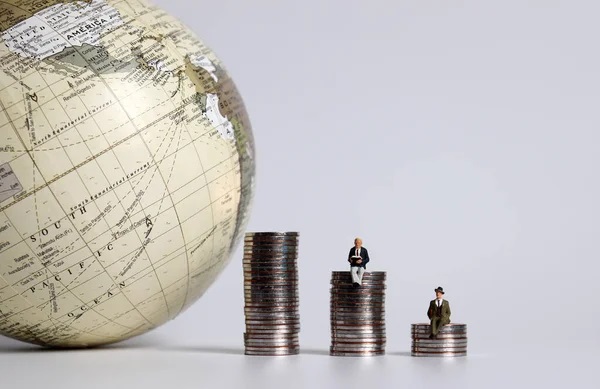
Correspondence between Muskan Aggarwal (Rural Management, Xavier Institute of Social Service, Ranchi) and Jolien Schoeters (International Relations and Diplomacy, University of Antwerp)
Dear Jolien,
Coming from the land of various religions, cultures and languages, I was looking forward to have a discussion on a topic that would allow me to present my views in a holistic manner, i.e take into account all the causes and effects for a particular situation and what better than the topic of Globalization to start with.
Ever since the concept of globalization came into existence, the individual approach to measure the world’s dynamics started changing. To begin with, some labeled globalization as a contemporary occurrence while some saw it as an extension of colonialism and imperialism. (globalisation-phenomenon) But the truth is, it has different meanings for people of different regions. For the developed nations, globalization is the ultimate parameter for economic growth, for developing, it’s a tool deemed necessary for the transfer of technology and knowledge and for the underdeveloped countries, it’s no less than a patron-client relationship, where in, only survival matters. After the Second World War, when almost all the nations were rebuilding themselves, there were some parts of the world where the light of resurrection simply never reached because of which, those regions remained undeveloped and were regarded backward by the elites.
Owing to that, it seems that Raúl Prebisch’s Dependency Theory still holds true (Prebisch’s view). The resources in any which form are flowing from the periphery countries to the core countries, which in turn is making the developed nations more developed and leaving the less developed behind. This could be perfectly understood using the example of America’s tech industry. The development of the entire Silicon Valley is fueled by the labor of a great proportion of Indian and Chinese workers, due to which only the core country’s economy i.e USA’s economy, keeps getting stronger and better (Indians-in-tech-). However, for the underdeveloped nations, the situation is even more dreadful. The poor countries of the African region, even after being abundantly rich in natural resources, couldn’t use it to their advantage, reason being, the destabilization of their nations by the west. At present, they also have 140 Billion Dollar debt to pay to China, which throws light on the never-ending vicious cycle of debt and backwardness of the African countries (Africas-rising-debt). The countries like Vietnam, Bangladesh, and Mexico have also faced consequences of such inequality by indulging themselves in labor-intensive industries, which only benefits the supreme and leaves the normal, tired and exhausted.
All these examples are proof of how inequality has made its strong-hold in today’s world using the garb of globalization. It isn’t only leading to wage inequality but is contributing to trade imbalance too by making the underdeveloped nations rely on developed nations for imports whilst neglecting the capability of their own exports.
In recent years, because of the emergence of the neo-liberal policies, the world’s wealth and income has been concentrated in fewer hands. In fact, according to one study by Oxfam, the total wealth of the world’s 388 richest was on a par with that of the bottom half of the global population in the year 2015 (Oxfam-report). This throws light on the ongoing battle the world is fighting with the so-called “capitalistic expansion” and its crony mindset. The over-exploitation of natural resources with the inevitable consequences of marginalization of tribal people and the associated indigenous knowledge, uncontrolled growth of inequalities in every sector and forced restructuring of the governments by big businesses, has led to a great division amongst nations, ultimately leading to omnipresent inequality that we witness everywhere and are unable to cope with.
The process of rapid globalization, called, hyper-globalization is also threatening the position of workers in secured jobs because, in present time, more attention is being given to the idea of automation and artificial intelligence and if this type of displacement of labor happens, then perhaps, the world would’ve to get rid of this obsolete social system and search for a new alternative that takes into account the sentiments of each and every strata of the society, whilst not completely denying the existence of inequality and its harsh reality. And as stated by the great sociologist, Max Weber, inequality won’t ever vanish and revolution for it is a distant possibility but economists could perhaps devise a way to deal with such imbalance.
What do you think about all of it though, Jolien? Is it possible to atleast curb this issue of inequality? Is there any economic system that could help us reach a balance in this regard? Also, has your country adopted measures to pacify this kind of situation?
Eagerly waiting for your response.
Thanks and Regards,
Muskan Aggarwal
10 May 2022 – Ranchi
Dear Muskan
First and foremost I want to thank you for your patience and your remarkably interesting letter in regard to globalisation processes and growing and enduring inequality. I found your insights and associations incredibly captivating and quite eye-opening as well.
I believe that the relation between globalisation and inequality was extremely well demonstrated during the recent Covid-19 pandemic as well. Despite the fact that the former unknown virus hit the whole of the international community around the same moment of time, equally unexpected and affected their societies is a similar disastrous manner, some countries appeared to enjoy a more privileged recovery process than others. Even though the pandemic demonstrated a great deal of national, and perhaps in some cases international, solidarity, I believe it clearly illustrated a pronounced social inequality within our globalised world of living as well. The rather unfair distribution of Covid-19 vaccines, for example, shoved the prevalent social and health-related disparity between, but also within, nations in the picture, more than ever. According to The World Health Organisation (WHO), the inequitable distribution of vaccines caused (and still causes) millions of people to remain vulnerable, which will have a lasting impact on socio-economic recovery of low and lower-middle income countries. This will hinder important international objectives in respect to social and economic improvements, such as the Sustainable Development Goals (SDGs), intended to be achieved in the year of 2030.
Although numerous world leaders pledge otherwise, the international vaccination campaign confirmed that the ethical framework of the more developed (western) countries, allows the argument that certain countries and/or citizens are more deserving than others. Despite the fact that in the year of 2021 enough vaccines were produced to cover seventy percent of the global population, the majority of the vaccines were received by wealthy countries, while other, less prosperous countries struggled (and still struggle) to vaccinate even a small amount of their citizens. Even WHO Director-General Doctor Tedros Adhanom Ghebreyesus has stated that vaccine equity is one of the major challenges of our time and that the international community is failing in respect to this important ethic responsibility. This unfair distribution is a direct result of the restrictive export of developed countries that applied the so-called ‘vaccine nationalism’ policy. This policy implies that vaccine-producing countries assembled Covid-19 doses for the purpose of providing their own citizens with vaccines in the first place. As a result, while populations within developed countries received their booster shots, African nations, for example, were still lobbying for their first Covid-19 shots.
In addition, vaccine inequality within nations proved to be a prevalent trend during the pandemic as well. Within the Israel-Palestine conflict, for example, this kind of social unfairness appear to be a dominant force. Despite the Israeli community’s deep sense of social responsibility regarding their own community, solidarity regarding health was not meant for all of Israel’s citizens. Since the beginning of the pandemic, Arab Israelis, or Palestinian Israelis, once again found themselves in a critical position in their own country. The Palestinian community in Israel had not only suffered a large number of fatal corona-related deaths, but was also subject to an excessively discriminatory policy, employed by Israeli authorities. Although this Arab minority makes up as much as 20 per cent of Israel’s population, the Netanyahu IV cabinet made it once again clear that this community was not a priority for Israel’s national well-being. The government’s perception of Palestinian Israelis as second-class citizens was evident, for example, in the unfair way it dealt with them at the beginning of the crisis. The government of the time did not respond to the needs and basic requirements of the Palestinian minority and was rather reticent when critical issues such as the optimisation of health care, distance education, public information, economic support projects, the right to privacy and civil liberties for Palestinian Israelis were addressed.
Despite the fact that the Arab minority in Israel faces discriminatory practices on a daily basis, the new implementations and restrictions provoked a new wave of outrage and controversy. Among other things, the situation in Israel’s ‘unrecognised villages’ clearly illustrates the unfair treatment of Palestinian residents. Such villages have been annexed by the Israeli government since Israel’s independence in 1948. Despite various efforts by Israel to drive these families away, for decades these Palestinians have refused to leave their homes because of the historical and legal claim they have on their piece of land. In addition, the nomadic Bedouin community belongs to the Palestinian minority in Israel and lives in such unrecognised villages. In addition to the usual shortcomings, such as potable water, education, housing and sanitation, since March 2020 these communities also lack the necessary health resources to withstand the corona crisis. The refusal to provide these hundreds of thousands of Palestinians with essential care during the pandemic and the fact that their, significant, number of fatalities are not part of Israel’s official statistics also demonstrates the Zionist settler politics and the Israeli Apartheid regime during the pandemic. Such cases also provide clear evidence that the Netanyahu IV cabinet used the pandemic as a convenient political tool to increase structural discrimination against Palestinians in the country.
What is your perception on this type of (international) social inequality and injustice? Did any kind of social or health inequality occur in your country during the pandemic? Or did the pandemic perhaps had other inequal processes as a consequence?
Hope to hear from you soon!
Kind regards
Schoeters Jolien
3 June 2022 – Antwerpen


